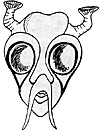 'This is a FANTASY, why can't I do it?" That is a question I have heard not long ago, ard I
have heard it before. Many people out there do not understand that any setting has to have an internal consistency to operate smoothly.
'This is a FANTASY, why can't I do it?" That is a question I have heard not long ago, ard I
have heard it before. Many people out there do not understand that any setting has to have an internal consistency to operate smoothly.
As an example of this, we have the person who was asking this in a Star Trek setting. They wanted to build a ship that could travel at Warp 4 for half as long as it can travel at Warp 2, ignoring the fact at Warp 4 is far more than twice as fast, it also takes considerably more than twice the energy to maintain a faster speed. Star Trek has laws of physics, including the laws of thermodynamics, so to be consistent this flaw can not be overlooked.
Another example is in Dungeon Design in a Fantasy setting. I personally have to ask when I put in any creature or treasure, 'why is this here?"
In biological terms, you will never find more than one "top predator" in a given area That means you will only find one main monster, or group of monsters in the case of families or other creatures which can woric together, in a given area...be it a dungeon or an outside temtory.
All creatures in the area will thus be subordinate to the main foe. A Dragon might have any number of minor scavengers which feed off what it considers insignificant leftovers. These could also be a threat to mere humans, but they would be relatively minor beings.
A Lich Lord or similarly potent undead could well have a huge force of undead slaves, after all, most undead do not need to eat. A bandit tribe, on the other hand, can have no more members than they can feed, it limits things.
Traps are similar, there must be an easy way through the traps for the owner, assuming he is skill alive and wants to get to whatever he has hidden. If you can fmd that way, you are in the clear. All traps, therefore, must have an escape unless the place is designed for protecting something significant from ANYTHING (for example, guarding a single artifact of the opposite alignment from the person who hid it might be cause for such a trick).
You have to watch not only the integrity of the dungeon itself, but also that of the setting as a whole. Let us take Birthright as an Example.
In the Birthright setting, only the Nobility are capable of magic, and very few of them are trained in it. In effect, there are only about 120 Mages on the entire continent, only perhaps 20 of which are high enough levd to even think about casting Enchant an Item or Permanence. By logic, then, you are not going to find very many magic items out there.
I extended the logic a bit, since Priests and NPC Alchemists, Potions and Holy items should still be as common as ever. I also noted Dwarves can create items which are effectively magical at a minor level, though possessing no real magic, due to superior materials and skills. That still means that nearly every magic item in the land is already in the hands of something that can use it.
This is another point many people forget, if someone has a magic item in their treasure trove, you can bet they wil1 use it to protect the trove. A dragon who has a magic sword in his armor could well shape change into a human and use that sword, if it is more effective than his natural weapons.
In general terms then, you will only find significant items in places of significant danger, normally being used against you.
There are two exceptions to this rule, plot devices and traps. A person could well find a significant item unguarded, if the item is required for the story line and there is no other way to get it to them. The trick with such items is to either take them away later, or make sure they are so difficult to keep that they might just as well have had to have the trouble getting it. On the other hand, if possession of the item is more trouble than it is worth, someone might well willingly let you have it (cursed items are good for this).
Just remember, logic functions within a setting, not outside it. It is perfectly logical to a student of chemistry, to boil their holy water to make the chlorine gas exhaled by a dragon turn into hydrochloric acid that will settle on the dragon's scales and damage it, but to the priest it is sacrilege and to the party in general it will sound stupid (not to mention one of them would have to know Alchemy to think of it). Do not let you players get away with doing things their characters would not know to do, but also do not penalize them for thinking of it except in the logical way for the setting. (In the dragon case above, the effect worked, but then the group had to go on a Quest to get the deity to forgive them.)
Back to White Knight #5 Table of Contents
Back to White Knight List of Issues
Back to Master Magazine List
© Copyright 1997 by Pegasus-Unicorn Productions
This article appears in MagWeb (Magazine Web) on the Internet World Wide Web.
Other military history articles and gaming articles are available at http://www.magweb.com